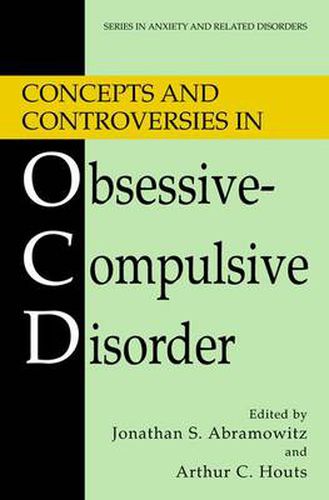Readings Newsletter
Become a Readings Member to make your shopping experience even easier.
Sign in or sign up for free!
You’re not far away from qualifying for FREE standard shipping within Australia
You’ve qualified for FREE standard shipping within Australia
The cart is loading…






This title is printed to order. This book may have been self-published. If so, we cannot guarantee the quality of the content. In the main most books will have gone through the editing process however some may not. We therefore suggest that you be aware of this before ordering this book. If in doubt check either the author or publisher’s details as we are unable to accept any returns unless they are faulty. Please contact us if you have any questions.
This unique volume gives readers a front-row seat at an exciting and crucial symposium. Recent advances in theory and treatment have significantly increased our understanding of obsessive-compulsive disorder (OCD). Yet research on OCD generally falls in categories of either behavioral or biological, and rarely do the two meet. Concepts and Controversies in Obsessive-Compulsive Disorder bridges this gap admirably. Featuring an international panel of 42 experts, this volume focuses in depth on–and presents opposing viewpoints to –the seven conceptual and practical disputes that characterize the field today: - categorical versus dimensional perspectives on symptoms - animal versus behavioral models - single OCD entity versus OCD spectrum - neuropsychiatric versus cognitive-behavioral models - cognitive therapy versus exposure therapy - self-directed versus therapist-directed treatment - medication versus cognitive-behavioral therapy These issues are presented in a debate format, with each side contributing a position paper on the topic, followed by a rebuttal from the opposite perspective. To further enrich the debate, timely chapters examine special areas such as sexual addictions, body dysmorphic disorder, trichotillomania, Tourette’s syndrome, and compulsive shopping in the context of OCD. This level of discussion and argument, with its possibility for collaboration and integration, makes Concepts and Controveries of Obsessive Compulsive Disorder unique and productive reading for students, researchers, and therapists of all orientations as they design the next generation of theory and greater nuances of treatment.
$9.00 standard shipping within Australia
FREE standard shipping within Australia for orders over $100.00
Express & International shipping calculated at checkout
This title is printed to order. This book may have been self-published. If so, we cannot guarantee the quality of the content. In the main most books will have gone through the editing process however some may not. We therefore suggest that you be aware of this before ordering this book. If in doubt check either the author or publisher’s details as we are unable to accept any returns unless they are faulty. Please contact us if you have any questions.
This unique volume gives readers a front-row seat at an exciting and crucial symposium. Recent advances in theory and treatment have significantly increased our understanding of obsessive-compulsive disorder (OCD). Yet research on OCD generally falls in categories of either behavioral or biological, and rarely do the two meet. Concepts and Controversies in Obsessive-Compulsive Disorder bridges this gap admirably. Featuring an international panel of 42 experts, this volume focuses in depth on–and presents opposing viewpoints to –the seven conceptual and practical disputes that characterize the field today: - categorical versus dimensional perspectives on symptoms - animal versus behavioral models - single OCD entity versus OCD spectrum - neuropsychiatric versus cognitive-behavioral models - cognitive therapy versus exposure therapy - self-directed versus therapist-directed treatment - medication versus cognitive-behavioral therapy These issues are presented in a debate format, with each side contributing a position paper on the topic, followed by a rebuttal from the opposite perspective. To further enrich the debate, timely chapters examine special areas such as sexual addictions, body dysmorphic disorder, trichotillomania, Tourette’s syndrome, and compulsive shopping in the context of OCD. This level of discussion and argument, with its possibility for collaboration and integration, makes Concepts and Controveries of Obsessive Compulsive Disorder unique and productive reading for students, researchers, and therapists of all orientations as they design the next generation of theory and greater nuances of treatment.